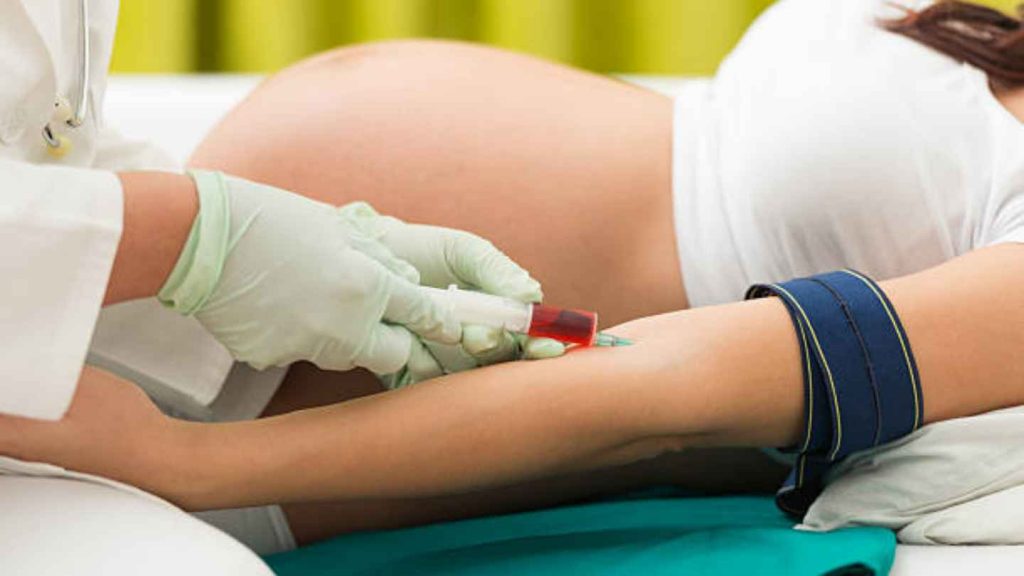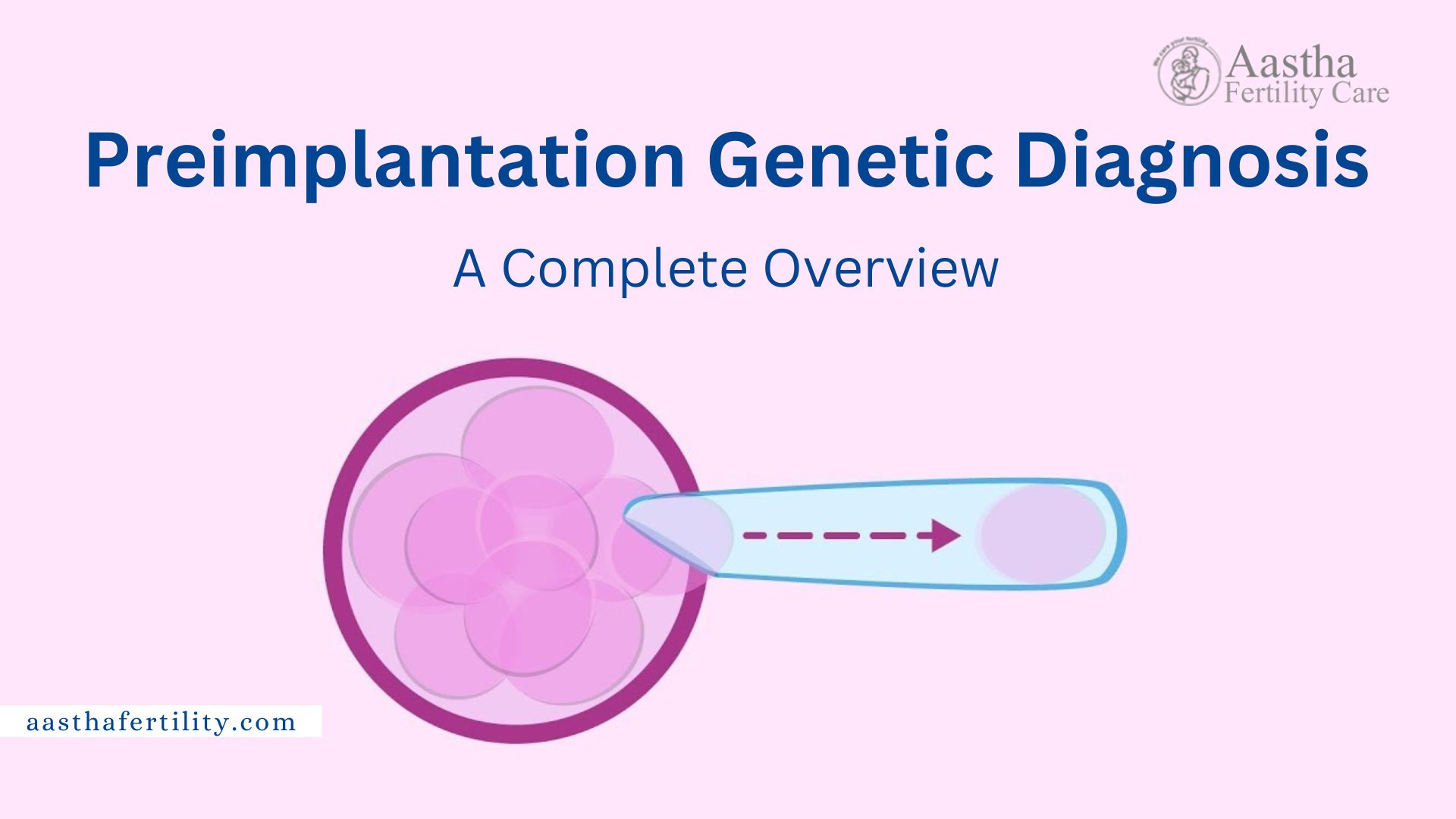Table of Contents
TogglePregnancy is a joyful time in a woman’s life. There may also be worries over the well-being of the unborn kid. Various tests and scans take place to alleviate the parent’s anxiety.
If you’ve undergone IVF treatment or have a family history of genetic disorders, double-marker testing can provide early detection and appropriate management of potential chromosomal abnormalities.
It is common for pregnant women to be anxious when advised to undertake a test they have never heard of, and the Double Marker Test is one of them.
However, there is no need to panic or let your pregnant hormones run out of control during these tests.
You want the best for you and your baby, and at Aastha Fertility Center, we share that goal. We understand the importance of quality healthcare services and the peace of mind that comes with early detection of potential issues.
Our team is passionate about supporting you every step of the way and providing the necessary guidance to ensure a healthy pregnancy. By scheduling an appointment with us, you are taking a proactive step towards a successful outcome.
Don’t wait, contact us today to learn more about our essential services and start your journey towards a healthy pregnancy.
What is a Double Marker Test In Pregnancy?

A double marker test in pregnancy refers to a test often administered to pregnant women to detect any chromosomal abnormalities in the fetus. Furthermore, this testing also plays a crucial role in detecting neurological disorders in the foetus, including Edwards syndrome and Down syndrome.
In a normal pregnancy, female fetuses will have 22 pairs of XX chromosomes, and male fetuses will have 22 pairs of XY chromosomes.
However, any chromosomal abnormalities in the fetus may cause severe developmental malformations and contribute to various health issues in the baby after birth. However, these abnormalities are very uncommon.
Usually, the doctor recommends the double marker test during pregnancy to women over the age of 35 and those with a family background of birth abnormalities and insulin-dependent type 1 diabetes. The doctor performs the blood test during the first trimester, often between the ninth and fourteenth week of pregnancy.
The Importance of Double Marker Test In Pregnancy
The test is generally optional, but if you are above 35 and there is a family history of miscarriage or diabetes, your baby might have an increased risk of chromosomal abnormalities.
It is essential to note that the result merely indicates if there is an elevated trisomy risk. Furthermore, it does not conclusively identify whether or not your child has abnormalities.
The Uses of Double Marker Test in Pregnancy
The several uses of the Double Marker Test are:
- It helps determine the likelihood that the unborn child may develop a mental condition.
- It is mainly used to identify Down syndrome.
- The Double Marker Test may also identify Trisomy 18, which causes mental impairment and severe birth abnormalities.
- Additionally, it aids in the identification of Trisomy 21.T, which causes mental issues, cardiac difficulties, and other diseases affecting essential organs.
The Process of Double Marker Test

The Double Marker test is a blood test that helps examine the Beta hCG (human chorionic gonadotropin hormone) and PAAP levels (Pregnancy-associated Plasma protein).
Here are some key points about the testing process:
- The test analyzes two specific hormones in a pregnant woman’s blood to determine the risk of Down syndrome and other chromosomal abnormalities.
- The test is performed through a simple blood draw, typically taken from the woman’s arm.
- The test can be done as early as the 10th week of pregnancy, but it is recommended to wait until the 11th to 13th week for more accurate results.
- The test results are usually available within a few days to a week after collecting the blood sample.
- If the results indicate a higher risk of chromosomal abnormalities, further testing may be recommended to confirm the diagnosis.
- The healthcare provider will explain the test results and discuss any necessary follow-up procedures if needed.
- The test is generally safe and relatively painless, with slight discomfort during the blood draw being the most common side effect.
Step-By-Step Double Marker Test Procedure
The double marker test is not compulsory. Nevertheless, it is proposed for expectant mothers who are beyond age 35 and has a high chromosomal issue.
The blood test is analysed, and an ultrasound test is known as nuchal translucency (NT) scan. It assesses the clear tissues behind the neck of your baby. The test concentrates on two markers. Free Beta HCG (human chorionic gonadotrophin) and PAPP-A (pregnancy-associated plasma protein-A) are markers.
Free Beta HCG contains glycoprotein hormone generated by the placenta during pregnancy. The high level of this hormone in the body contributes to a higher risk of Trisomy 18 and Down syndrome.
PAPP-A is an important plasma protein. Low plasma protein levels also contribute to a higher risk of down syndrome.
Further, the amounts of these components in the blood will help determine whether the infant has neurological or chromosomal problems with the help of a blood test.
Apart from the blood test, the doctor may also perform ultrasonography.
Timing of The Test
The double marker test should be done within the first trimester or at the beginning of the second trimester. This is because of the blood drawn for the double marker test. The timing of the test should be between 11-14 weeks.
What To Expect After The Test?
The double marker test in pregnancy is a simple blood exam. As this is a non-fasting test, you can eat and drink before your examination unless otherwise indicated.
The test results may vary depending on the lab you choose for your test.
Double Marker Test In Pregnancy Normal Values
The findings of the Double Marker test may be broadly categorized as Positive or Negative. The findings do not definitively determine if the baby has a problem. So it just evaluates the likelihood that the infant has the disease. The results are provided in ratio form.
So a ratio between 1:10 and 1:250 will be regarded as Screen positive, indicating a strong likelihood that the baby has the condition. Further, a ratio of 1:1000 is Screen negative, indicating that the likelihood of chromosomal or neurological abnormalities in the baby is minimal.
However, this test is insufficient, and if the findings are positive, the doctor may request more testing to confirm the likelihood that the infant has a condition.
What If The Test Results Are Positive?
There are worse things in this life than having babies with a disability. It is normal to feel some concern if the test is positive. After processing the facts, however, it is essential to realize that this is not the end of the story. More conclusive and sometimes more intrusive procedures may confirm your findings, including noninvasive prenatal testing (NIPT), amniocentesis, or chorionic villous sample. Even though some of these tests pose a danger to your pregnancy, they deliver conclusive results.
Since the double marker test is performed early in your pregnancy, you will have enough time to make crucial choices regarding additional testing, medical treatments, and the effective management of your pregnancy and birth.
Understanding your risk could also help you plan for the possibility of having a baby with special needs and get the necessary assistance. These children may have a regular life for the rest of us; they require a little additional attention.
The Double Marker Test In pregnancy Price
The test price varies based on city, test quality, and availability, as this test is only accessible in certain locations. So on average, the price is between 2,500 and 3,500 rupees. However, these prices are approximate only; real pricing may vary.
| City | Double Marker Price |
|---|---|
| Delhi | 1320 Rupees |
| Banglore | 1800 Rupees |
| Pune | 1280 Rupees |
| Chennai | 1800 Rupees |
| Ahmedabad | 2699 Rupees |
| Kolkatta | 3000 Rupees |
| Noida | 2800 Rupees |
| Gurgaon | 1320 Rupees |
| Hyderabad | 760 Rupees |
| Amritsar | 2000 Rupees |
Few Other Screening Tests
Genetic Screening Test
A genetic screening prenatal test is precise in searching for changes in the baby’s genes. This is because gene changes can cause genetic disorders or abnormalities. In pregnant women, genetic testing can be done through amniocentesis using amniotic fluid or through the placenta.
Maternal Serum Screening
MSS proffers the same result as a double marker screening test. It also tests for Down Syndrome, Edward syndrome, or a Neural Tube Defect l. It is usually done in the first trimester or the early part of the second trimester.
First Trimester Screening
This is another name for Double Marker Screening
Three Marker Test in Pregnancy
This is a blood test that gauges three features: alpha-fetoprotein, human chorionic gonadotropin, and unconjugated estriol. The blood test results can help the doctor infer if the child has a higher risk of birth defects.
Quadruple Marker Test
A quadruple marker test is similar to a triple test in that it also tests for Inhibin, a hormone released by the placenta. Making it four hormones is different from the triple test, which features three hormones. This test is also to infer if the child has certain birth defects. It is done between the 15th and 22nd week of pregnancy but most accurately within the 16th and 18th week of pregnancy.
Nt Scan
This scan is similar to the double marker test.
Uterine Doppler
This test checks the blood flow of the uterine arteries. The flow of blood vessels can deduce if the child will grow to full term or not. The flow of blood vessels also determines the chances of developing pre-eclampsia (a blood pressure condition in pregnancy).
Potential Risks Involved with Diagnostic Tests
It’s important to understand that no screening test provides 100% accurate results, and there are always some limitations and risks involved with these tests. The main pointers to consider are-
- Diagnostic tests may result in false positives, which indicate a problem when there is none, or false negatives, which fail to detect a problem when one exists.
- Amniocentesis and chorionic villus sampling involve inserting a needle into the uterus to obtain a sample for testing. The small risk of miscarriage (less than 1%) is due to possible damage to the placenta or accidental injury to the fetus during the procedure.
Our experts at Aastha Fertility Center use advanced equipment and technology, while offering comprehensive counselling and support to help patients make informed decisions about their care.
Lifestyle Changes That Can Affect The Dual Marker Test Results
Some lifestyle changes and habits also have a significant impact on the double marker test results. Hence, it is essential to be aware of these changes to take a precautionary step-
- Smoking: Smoking during pregnancy can lower PAPP-A levels in the mother’s blood, which may result in an inaccurate test outcome, including false-positive results or an incorrect interpretation of the test.
- Medications: The levels of PAPP-A and β-hCG in the mother’s blood can be affected by certain medications like blood thinners or aspirin. It is crucial to inform your healthcare provider of any medications you are taking before undergoing the test.
- Maternal Weight: The accuracy of the test results may be affected by maternal weight. Women who are overweight or obese may have lower PAPP-A levels, which could result in a false-positive outcome.
- Previous Pregnancy Complications: Women who have experienced pregnancy complications in the past, such as miscarriage or pre-eclampsia, may have altered levels of PAPP-A, which can impact the accuracy of the test results.
- Age: The age of the mother is a factor that can impact the accuracy of the test results. Women over 35 years old have a higher risk of chromosomal abnormalities, which may lead to different interpretations of the test results.
- Stress: Experiencing high levels of stress during pregnancy can also potentially impact the accuracy of the test results. To minimize stress levels, engaging in relaxation techniques and self-care practices is essential.
By sharing any lifestyle changes or factors that may impact the accuracy of your test results with your healthcare provider, you can help ensure that the results are correctly interpreted and that you receive the appropriate follow-up care if necessary.
Conclusion
The double marker test plays a critical role in ensuring the health of pregnant women, particularly those undergoing IVF treatment. It’s imperative for expectant parents to understand their child’s health during pregnancy, and doctors recommend several tests, including the double marker test, to achieve this goal. Although these tests are merely indicators of potential chromosomal abnormalities and not conclusive, the decision to take the test lies with the parents.
If you’re planning a pregnancy or are already expecting, it’s crucial to prioritize your health, manage any existing health conditions, and have a safe pregnancy and a healthy baby. At Aastha Fertility, we’re committed to supporting you throughout this journey and making it as wonderful as possible. Reach out to us today for assistance.
Frequently Asked Questions
1. Is there any risk associated with a double marker test in pregnancy?
The double marker test has no associated risks. Furthermore, this is a standard, noninvasive blood test. However, you should adhere to your doctor’s directions and contact them in case of any concerns.
2. Is a duplicate test marker mandatory?
It is not mandatory. However, assessing whether chromosomal abnormalities are a possibility or risk is recommended.
3. What if the Double Marker test comes back negative?
The likelihood of your baby experiencing chromosomal or neurological abnormalities is very low if test results are negative.
4. Is the double marker test painful?
No, the double marker test is not painful as only a small needle is inserted during the process.
5. How experienced are the technicians performing the test?
Experienced doctors have an idea about the accuracy of the double marker tests which is important to reduce the risks of the procedure.
6. Is the double marker test covered by insurance?
Coverage for double marker tests in insurance depends on the insurance provider’s policy. However in most cases, when not advised by the fertility experts, the test’s costs are not covered under insurance.





Leave a comment